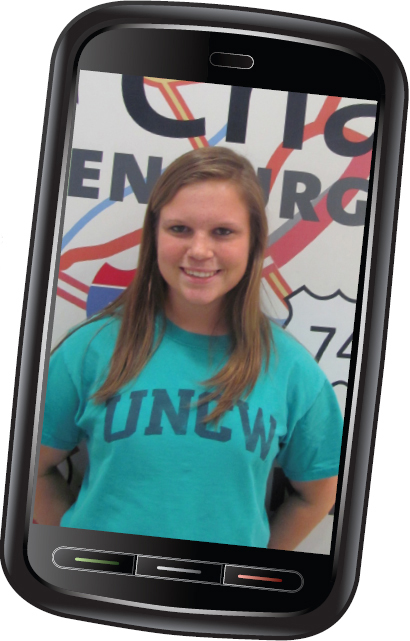Introduction with Student Profile
| 5 | Critical Thinking |
IN THIS CHAPTER YOU WILL EXPLORE
Thinking for ourselves and coming up with new conclusions will be really helpful when we enter the workforce.
Kelsey McManus, 18
Nursing major
University of North Carolina Wilmington
As a nursing student at the University of North Carolina Wilmington (UNCW), Kelsey McManus understands the importance of critical-thinking skills both inside and outside the classroom. When Kelsey arrived on campus last fall, she learned that she would be living in the international residence hall with students from all over the world. She quickly learned that interacting with people who don’t know anyone else in the United States and who have different customs, study habits, and food, among other things, presents some welcome challenges and tested her critical-thinking skills. “Some of the questions the international students ask about America make me think in a different way because I never think about my own country in that way.” One way she has been able to reach out to the students she lives with is by joining the International Student Organization, which helps bring new international students to campus and get them settled into campus life.
Kelsey grew up in Baltimore and decided to attend UNCW because nursing interested her and because the school had recently built a new nursing school (the laid-back atmosphere and location near North Carolina’s beaches didn’t hurt either!). So far, her favorite class has been Introduction to Psychology. She has found critical-thinking skills essential to succeeding in all her classes. “Professors will give you a lot of facts and general information, but they expect you to be able to relate all the information and come up with your own conclusions. Thinking for ourselves and coming up with new conclusions will be really helpful when we enter the workforce,” she says.
After Kelsey graduates, she’s open to new experiences and opportunities, but she hopes to continue on to graduate school. As a future nurse, she says that “critical-thinking skills will help a lot when dealing with cases and needing to figure out what symptoms lead to which diagnoses. They will also be helpful in clinical settings.” Her advice to other first-year students? Look for ways to recognize problems and come up with their own unique solution.

As Kelsey mentioned, arguably the most important skills you’ll acquire in college are the ability and the confidence to think for yourself. Courses in every discipline will encourage you to ask questions, sort through competing information and ideas, form well-reasoned opinions, and defend them.
If you have just completed high school, you might be experiencing an awakening as you adjust to college. If you’re an older returning student, discovering that your instructors trust you to find valid answers could be both surprising and stressful. If a high school teacher asked, “What are the three branches of the U.S. government?” there was only one acceptable answer: “legislative, executive, and judicial.” A college instructor, on the other hand, might ask, “Under what circumstances might conflicts arise among the three branches of government, and what does this reveal about the democratic process?” There is no simple—or single—answer, and that’s the point of higher education. Questions that suggest complex answers engage you in the process of critical thinking.
Most important questions don’t have simple answers, and satisfying answers can be elusive. To reach them, you will have to discover numerous ways to view important issues. You will need to become comfortable with uncertainty. You must also be willing to challenge assumptions and conclusions, even those presented by so-called experts. It is natural to find critical thinking difficult and feel frustrated by answers that are seldom entirely wrong or right, yet the complicated questions are usually the ones that are most worthy of study. Also, working out the answers can be both intellectually exciting and personally rewarding. In this chapter we will explain how developing and applying your critical-thinking skills can make the search for truth a worthwhile and stimulating adventure.